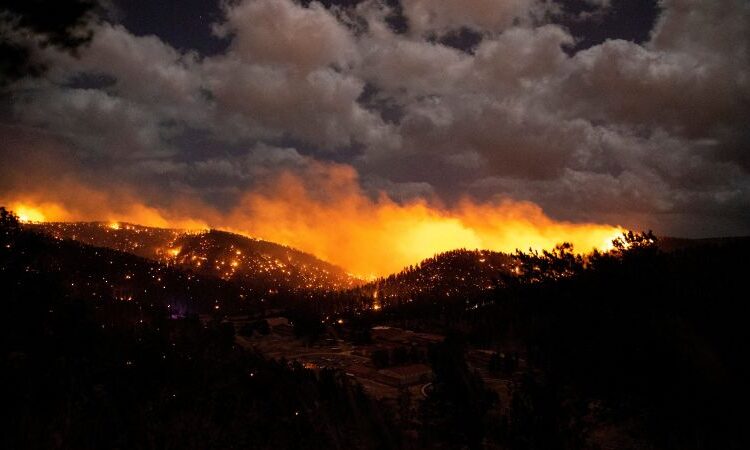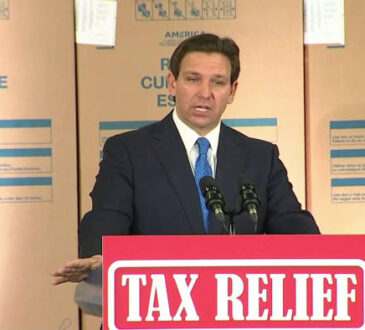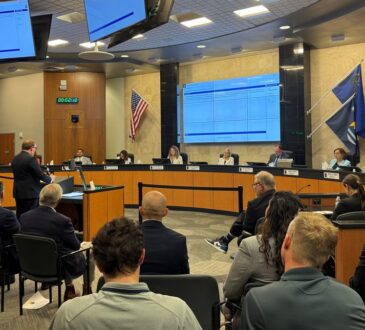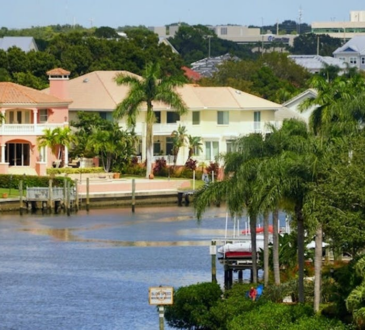Wildfires are dealing a massive blow to US real estate and homeownership, congressional report finds

CNN
—
Climate change-fueled wildfires are costing the US economy between $394 billion to $893 billion annually, a new congressional report suggests – a shocking figure that is more than double what previous government reports have estimated.
The new report from the Joint Economic Committee, chaired by Democratic Sen. Martin Heinrich of New Mexico, examined a wide range of costs beyond immediate wildfire damage, including impacts to real estate value; premature deaths and health risks from wildfire smoke; threats to watersheds; and income loss. The report was shared first with CNN.
The range Heinrich’s committee found, which was adjusted for inflation, is significantly higher than a Trump administration report that examined fewer impacts and found the annual cost for wildfires was between $87.4 and $427.8 billion.
“The topline numbers are scary,” Heinrich told CNN. “Even if you live someplace where wildfire has never been an issue, these are numbers that are big enough to be systemically problematic for the economy.”
Heinrich said he and his staff wanted to look at the cascading economic costs from wildfires – including effects that continue long after a fire has been extinguished – and make a case for why lawmakers and officials should spend money proactively on resilience measures.
“There’s always been this frame from some policymakers that we can’t afford to do anything about climate change,” Heinrich said. “And the reality is, the real costs to our economy are to not do anything about it, and let this run away to an even worse outcome down the road.”
The diminished US real estate value is by far the largest portion of the total cost. The report estimates real estate has suffered anywhere from $67.5 to $337.5 billion a year due to wildfires. In comparison, the report estimates insurance payouts for wildfire damage at $14.8 billion per year, and annual premium increases around $1.6 billion.
But the figures are also uncertain because the impact on real estate markets is just starting to be understood, an outside expert said.
“There’s a lot of uncertainty there, that’s fair,” said Ed Kearns, the chief data officer for nonprofit First Street Foundation, who was not involved in the report. “It’s still evolving as we speak because the insurance industry is just making these adjustments. What those ultimately will be, we’re not exactly sure how big yet.”
Disaster experts are warning the US is on the precipice of larger economic implications around wildfires and real estate. In fire-prone California, home insurance prices are skyrocketing, and several insurers have stopped writing new policies, citing more destructive fires.
There’s also evidence that the emerging insurance crisis is already having an impact on home prices, said David Jones, the former California insurance commissioner and director of the Climate Risk Initiative at UC Berkeley’s Center for Law, Energy and the Environment.
Homeowners who have had to take on a higher insurance premium may have a tougher time selling their home. Homebuyers also need to factor higher premiums into their monthly payments, reducing the amount of home they can afford – assuming they can get a policy at all.
“It stands to reason that if you’re a homebuyer, you’re going to ask the question, what’s it going to cost me to insure this place, and can I get insurance?” Jones told CNN in a recent interview. If the answer is insurance is really expensive and hard to get, he added, “then homebuyers are saying, ‘I’m not going to pay as much for this house, because it’s simply not worth as much.’”
Kearns agreed, saying that federally backed mortgage giants Fannie Mae and Freddie Mac are starting to take notice of some insurance companies in California removing fire coverage from their policies, or not issuing new policies altogether.
“It just wasn’t really on their radar; flood was the major driver of default,” Kearns said. “Fannie and Freddie have now changed their tune now that insurers are decoupling.”
The congressional report also considered the impacts wildfires can have on drinking water – something not measured in the previous federal report, but an issue that has become even more critical as the West faces a drier future. In recent years, wildfires have contaminated nearby streams and rivers that supply water to communities – leaving some with the threat of running out of drinking water.
As a massive wildfire scorched the northern New Mexico last year, the sludgy ash and charred soil left behind slid into the Gallinas River – threatening the drinking water supply for the city of Las Vegas, New Mexico. Staring down just weeks of fresh water left before they found an extra supply, city officials were hoping for federal grant money for an upgraded water treatment system to filter out tiny particles of contamination and make the water safe to drink.
Heinrich said the watershed costs the report found were “very substantial.”
“Communities like Mora and Las Vegas that have had to figure out how to provide clean drinking water to their constituents post-fire, you realize how expensive clean water really is and how infrastructure dependent it is,” Heinrich said.




